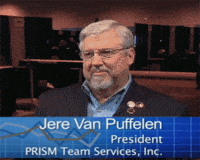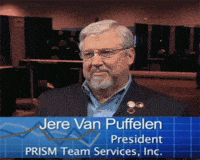The most challenging issue in Logistics today? PEOPLE!

Q: Jere, why do you say that the most challenging issue in logistics today is people?
A: I think our industry has some great challenges with developing the people who are performing the work of getting product from the manufacturer to the grocery shelf: Customer Service reps, drivers, warehouse folks, and the fulfillment people. I think our industry does a great job in developing and continuing education of upper management and the management level but not so well with the front line people and people making it happen – getting product in and out the doors every day. We need to be asking ourselves, ‘How can we better attract good people to the industry? ‘How can we better equip them? and ‘How can we provide career ladders for upward mobility within the industry?’
Q: Are we doing what we need to do to develop people in the logistics industry, giving that businesses continue to evolve? So your view is maybe we are doing some things right in developing upper management but we need to do more for other levels in the enterprise. Is that your view?
A: It is. CSCMP is a good example of the training and development for management and upper levels of the industry. I’m in the 3PL side of the business and I’ve gotten most of my industry training from IWLA. I’ve been a member of CSCMP and WERC since the late 70’s and I’ve enjoyed those associations. But industry specific training has come from IWLA. We need to determine what would make our business and entry level positions more attractive to people who don’t necessarily have college education to show that even without a college education, there are ladders with upward mobility within the industry. I was fortunate to go to college and actually started working 40 years ago in Denver loading boxcars and moved up to start my own company. If we can portray those ladders and that if you work hard and learn the industry, there are opportunities for growth. That will help attract people into doing the jobs we have to have to get the work done. We are going to have driver shortages and shortages of people that have to make the work go on day in and day out.
Q: Are there some initiatives that are address the challenge?
A: CSCMP and WERC are broad based professional societies. I’ll speak to IWLA, our trade association
and the 3PL warehouse side of it. We have developed a mentoring program for people coming up within the ranks to identify ways to train them better. Also, how can we make it more attractive for people coming in to the industry? We want to have programs available to help people see the career ladders available when they enter the industry. If someone comes in as a warehouseman he or she can become a supervisor or manager. With the technology changes that are going on in our industry, all of our employees need to be more tech savvy, because that’s the way the industry is going, but we need to be more tech savvy in the way we reach out to train people and offer training and opportunities to improve themselves. Drivers, warehousemen and CSRs, are not someone we can send across country to a CSCMP or WERC conference but we can provide opportunities to view webinars or a series of programs to help them to move up in their career ladders.
Q: How do we optimize the different generations? From millennials to boomers for example?
A: I’ve been in business over 40 years. The really young folks coming into the workforce don’t have the same caution we had as young workers. There is more willingness to reach out and take risks. This can be a good thing. Being in the business 40 years, I’ve stepped into a pile or two! The benefit I can offer young folks is to share what I did, what worked and what did not. Mentoring is a tremendous tool within the industry. Our trade association has “Master Minds” groups that meet in small groups by conference call and talk about various subjects, unique to that group that help build personal skills. With a mentoring program we can help young employees to understand and deal better with those challenges they might face. Mentoring within IWLA is a big component in reaching out and trying to help other people along in the industry.
Q: What advice would you give to someone just starting out?
A: I started out in the YMCA before I came into this industry. My boss gave me two pieces of advice that I remember to this day. He said, “if you never do more than what you are paid for, you’ll never get paid for more than you do,” and “Never put off till tomorrow what should be done today.” This advice has served me well.
It takes hard work. This is not an easy industry. Logistics is very exciting and one of the reasons I enjoy it so much is that it’s not the same day in and day out. It’s always new and exciting. If you are willing to work hard at it, and you want to advance there are tremendous opportunities for growth in the industry. I would certainly recommend it to anyone interested in getting in and working in the industry.
Robert J. Bowman, Closing: We talk about logistics, supply chain, technology and process but it always boils down to the importance of people. Our thanks to Jere Van Puffelen, president of PRISM Logistics talking about People, the Most Challenging Issue in Logistics.



